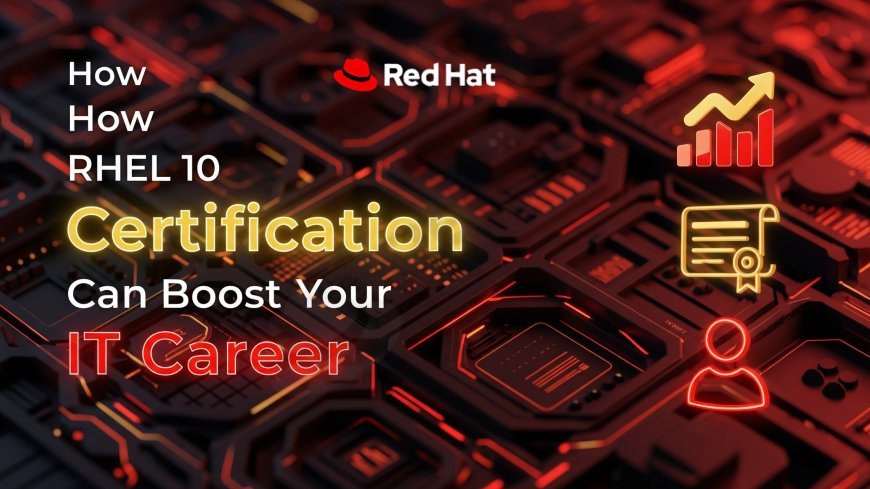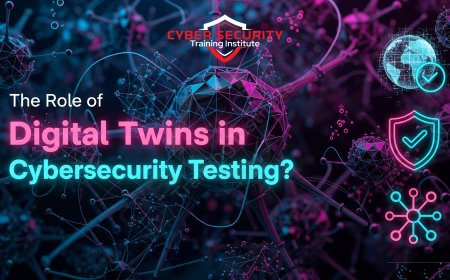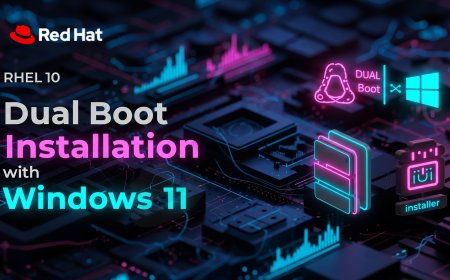How RHEL 10 Certification Can Boost Your IT Career
In a competitive IT job market, a Red Hat Enterprise Linux (RHEL) certification is a powerful catalyst that can significantly boost your career. This in-depth article explains the tangible career benefits of earning a certification on the latest version of RHEL. We explore why the 100% hands-on, performance-based nature of the exams makes them the "gold standard" in the industry, providing employers with verifiable proof of your practical skills. Discover how these respected credentials can unlock access to new and more senior job opportunities, increase your earning potential, and make your resume stand out from the crowd. The piece features a comparative analysis that maps the different levels of certification, from RHCSA to RHCE, to the specific, high-demand job roles they open up, such as System Administrator, DevOps Engineer, and Cloud Architect. We also discuss how the process of studying for a certification is a valuable investment in building a strong, foundational skill set that will keep you relevant in the ever-changing world of enterprise IT. This is an essential read for any IT professional looking to understand how a RHEL certification can be a direct and powerful investment in their long-term career growth.

Introduction: The Proving Ground for Your Skills
In a crowded and competitive IT job market, how do you prove that you're not just another resume in the stack? Real-world experience is vital, but a verifiable, respected credential is what gets your resume noticed in the first place. For decades, in the world of enterprise computing, a Red Hat certification has been the undisputed gold standard for Linux professionals. Earning a certification on the latest version of Red Hat Enterprise Linux (RHEL) is one of the most powerful steps you can take to accelerate your career. It provides immense benefits by serving as a powerful validation of your hands-on skills, increasing your earning potential, and opening doors to new and more senior roles that might otherwise be inaccessible.
The Credibility Factor: The Power of Performance-Based Exams
The first and most important reason why Red Hat certifications are so respected by employers is because of how they are earned. Unlike many other IT certifications that rely on multiple-choice questions to test theoretical knowledge, Red Hat exams are 100% hands-on, performance-based labs. When you sit for an exam like the Red Hat Certified System Administrator (RHCSA), you are not asked questions. You are given a live, running RHEL system and a list of real-world administrative tasks to complete in a time-pressured environment.
This practical format is the ultimate proof of skill. It proves to an employer that you don't just know about Linux; it proves that you can actually do the job. You have demonstrated that you can apply your knowledge to solve real problems and configure real systems according to specifications. This dramatically reduces the hiring risk for a company. When a hiring manager sees a current Red Hat certification on a resume, they have a high degree of confidence that the candidate possesses genuine, practical skills. This credibility is the foundation of the certification's value.
Unlocking New Tiers of Opportunity and Earning Potential
A Red Hat certification is a direct investment in your financial future and career mobility. In a competitive job market, it acts as a powerful differentiator.
- Getting Past the Filter: Many companies, especially large enterprises, have Red Hat certifications listed as either a mandatory or a highly preferred qualification for their top technical roles. In many cases, an automated applicant tracking system or an HR screener will filter out resumes that don't contain these keywords. Having the certification is often the key that gets your resume into the hands of the actual hiring manager.
- Access to Better Jobs: The certification is your ticket into the world of high-stakes, enterprise IT. While smaller companies and startups might use a variety of operating systems, the world of large-scale finance, telecommunications, and cloud infrastructure is heavily dominated by RHEL. The best and highest-paying jobs in these sectors often require or strongly prefer RHEL expertise.
- A Quantifiable Salary Increase: The value of these certifications is directly reflected in salary. Numerous independent industry salary surveys consistently show that certified IT professionals command a significantly higher salary than their non-certified peers, even with the same number of years of experience. The certification is a quantifiable return on investment.
A Clear Path for Career Progression
The Red Hat certification program is more than just a single exam; it's a well-defined and respected career ladder that can guide your professional development from a junior administrator to a top-tier architect. This clear path is a huge benefit for professionals who are serious about building a long-term career.
- The Foundation (RHCSA): The Red Hat Certified System Administrator is the essential starting point. Earning this validates that you have the core, foundational skills to be a competent Linux administrator.
- The Specialization (RHCE): The Red Hat Certified Engineer demonstrates your mastery of automation with Ansible. This is the critical step for moving beyond traditional system administration and into the more senior and highly sought-after roles in DevOps, Site Reliability Engineering (SRE), and Cloud Engineering.
- The Expert Level (RHCA): The Red Hat Certified Architect is the pinnacle of the certification ladder. It requires you to hold an RHCE and then pass five additional, high-level exams in specialized areas like cloud services or security. It signals to the industry that you are a true, top-tier expert.
.
Comparative Analysis: The Career Impact of RHEL Certifications
Each level of certification has a distinct and progressively more powerful impact on an IT professional's career trajectory and opportunities.
| Career Stage | No Certification | RHCSA Holder | RHCE Holder |
|---|---|---|---|
| Getting the Interview | Relies entirely on the strength of your resume and demonstrated experience. May be filtered out by automated systems looking for certifications. | Your resume immediately stands out. You meet a very common "preferred" or "required" qualification for a wide range of Linux jobs. | You become a high-value candidate for more specialized roles. You are more likely to be actively recruited for your automation skills. |
| Job Roles Accessible | Entry-level IT support, junior roles, or roles in non-enterprise environments. | Linux System Administrator, Cloud Administrator, IT Operations Engineer, Technical Support Engineer. | DevOps Engineer, Site Reliability Engineer (SRE), Automation Architect, Senior Cloud Engineer, Senior Systems Administrator. |
| Salary Potential | The baseline salary for a given role and experience level. | A significant and measurable salary increase over non-certified peers in the same role. | Access to a higher tier of salary bands that are associated with the high-demand fields of automation and senior engineering. |
| Professional Credibility | Your credibility is based solely on your past work history and your performance in a technical interview. | You have verifiable, industry-standard proof of your core, practical administrative skills, which builds immediate trust. | You are recognized as an expert in automation, which is one of the most in-demand and respected skill sets in the entire IT industry. |
Building a Foundation for Future Skills
One of the most important, but often overlooked, benefits of pursuing a RHEL certification is that you are building a powerful foundation for all your future learning. The world of IT is in a state of constant change. The hot technology of today might be a legacy system tomorrow. But almost all of these advanced technologies—from Kubernetes and containers to public cloud platforms like AWS, to advanced cybersecurity tools—are built on top of a Linux foundation.
The deep, fundamental understanding of the Linux operating system, the command-line interface, and automation that you gain while studying for the RHCSA and RHCE are not just skills for one product. They are transferable, foundational skills that will make it much easier for you to learn and master every other advanced technology in the modern datacenter. It's not just a certification; it's a powerful and lasting education in the core principles of modern IT.
Conclusion: A Direct Investment in Your Professional Future
In a competitive and fast-moving IT landscape, a Red Hat certification on the latest version of RHEL is far more than just a logo to put on your resume. It is a respected and verifiable testament to your practical, hands-on abilities. It is a direct and powerful way to differentiate yourself from other candidates, to prove your expertise to hiring managers, to command a higher salary, and to provide yourself with a clear, structured path for advancing your career from an administrator to an architect. In a world where your skills are your most important professional asset, investing the time and effort to earn a RHEL certification is one of the single most effective investments you can make in your own future.
Frequently Asked Questions
Which Red Hat certification is best for beginners?
The Red Hat Certified System Administrator (RHCSA) is the essential starting point for anyone new to the Red Hat ecosystem. It is the foundational certification and a prerequisite for most other advanced certifications.
Does an RHCSA guarantee me a job?
No certification can guarantee a job on its own. However, it significantly increases your chances by making your resume stand out and by providing verifiable proof of your practical skills during the hiring process.
How long does it take to study for the RHCE?
This depends heavily on your prior experience with Ansible automation. For an experienced administrator who is new to Ansible, it could take several months of dedicated, daily practice to be ready for the exam.
Is the RHCE still valuable now that it's focused on Ansible?
It is arguably more valuable than ever. Automation is one of the most in-demand skills in the entire IT industry, and the RHCE is widely considered the premier, hands-on certification for validating your Ansible skills.
How do employers verify a Red Hat certification?
You are given a unique certification number that an employer can use on the official Red Hat verification portal to confirm your status. You also receive a verifiable digital badge.
Can I get a job with just a certification and no experience?
It is challenging. A certification is a powerful tool that validates your skills, but most employers will also be looking for some form of real-world or hands-on project experience as well.
Do Red Hat certifications expire?
Yes, they are considered "current" for three years. This is to ensure that certified professionals keep their skills up to date with the latest versions of the technology.
What is an SRE?
SRE stands for Site Reliability Engineer. It is a modern IT role that focuses on using software engineering principles to automate and improve the reliability of IT infrastructure. An RHCE is a highly relevant certification for this role.
What is a "performance-based" exam?
It means you are graded on your ability to actually perform real-world tasks on a live system, not just on your ability to answer multiple-choice questions. You must successfully configure the system to pass.
What is a digital badge?
A digital badge is a secure, verifiable digital representation of your certification that you can display on your LinkedIn profile, your email signature, or your resume.
Why is a "current" certification so important?
Because the technology changes so quickly. Holding a certification on the latest version of RHEL proves to an employer that your skills are up-to-date and relevant to the modern IT environment.
What is the difference between RHEL and Fedora?
Fedora is the community-driven, upstream "testing ground" for new features. The most stable of these features eventually make their way into RHEL. RHEL is the stable, secure, and commercially supported final product for enterprises.
Is the RHCSA enough, or should I also get the RHCE?
The RHCSA is an excellent goal and is sufficient for many system administrator roles. You should pursue the RHCE if your career goal is to move into more senior roles that involve automation, such as DevOps or cloud engineering.
How much does the training cost?
The cost varies significantly depending on the format (online vs. offline) and the training partner. Red Hat's own official training is the most expensive, while self-study can be done for just the cost of the exam.
What is "hands-on" experience?
This refers to the practical experience of actually working on a command line, configuring systems, and troubleshooting problems, as opposed to just reading about them. It is essential for passing the exams.
Is a Red Hat certification respected outside of the Linux world?
Yes. Because of its reputation for being a difficult, practical exam, it is highly respected throughout the entire IT industry as a benchmark of a person's technical competence and dedication.
What is a "digital native"?
This is a term for a person who has grown up in the digital age and is very comfortable with technology. This term is not directly related to RHEL certification.
What is a DevOps Engineer?
A DevOps Engineer is a role that bridges the gap between software development (Dev) and IT operations (Ops). A key part of their job is automating the building, testing, and deployment of software, which is why the Ansible-focused RHCE is so valuable for them.
What is a "career ladder"?
A career ladder is a formal, structured path for advancement within a profession. The RHEL certification track (from RHCSA to RHCE to RHCA) provides a clear ladder for career progression.
What is the biggest career benefit of a RHEL certification?
The single biggest benefit is credibility. It is verifiable proof to the entire industry that you have a high level of practical, hands-on skill in the world's leading enterprise operating system.
What's Your Reaction?
 Like
0
Like
0
 Dislike
0
Dislike
0
 Love
0
Love
0
 Funny
0
Funny
0
 Angry
0
Angry
0
 Sad
0
Sad
0
 Wow
0
Wow
0















